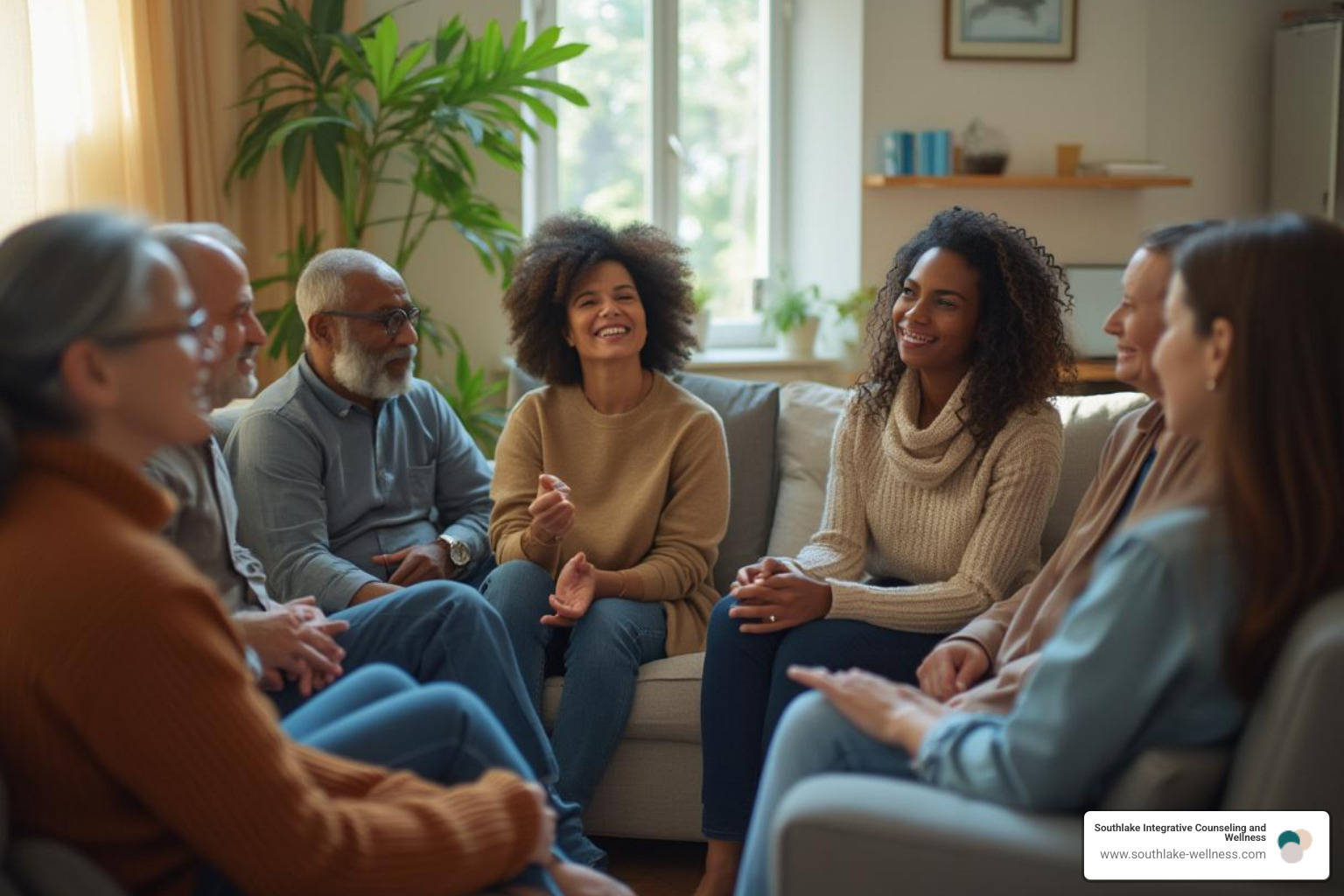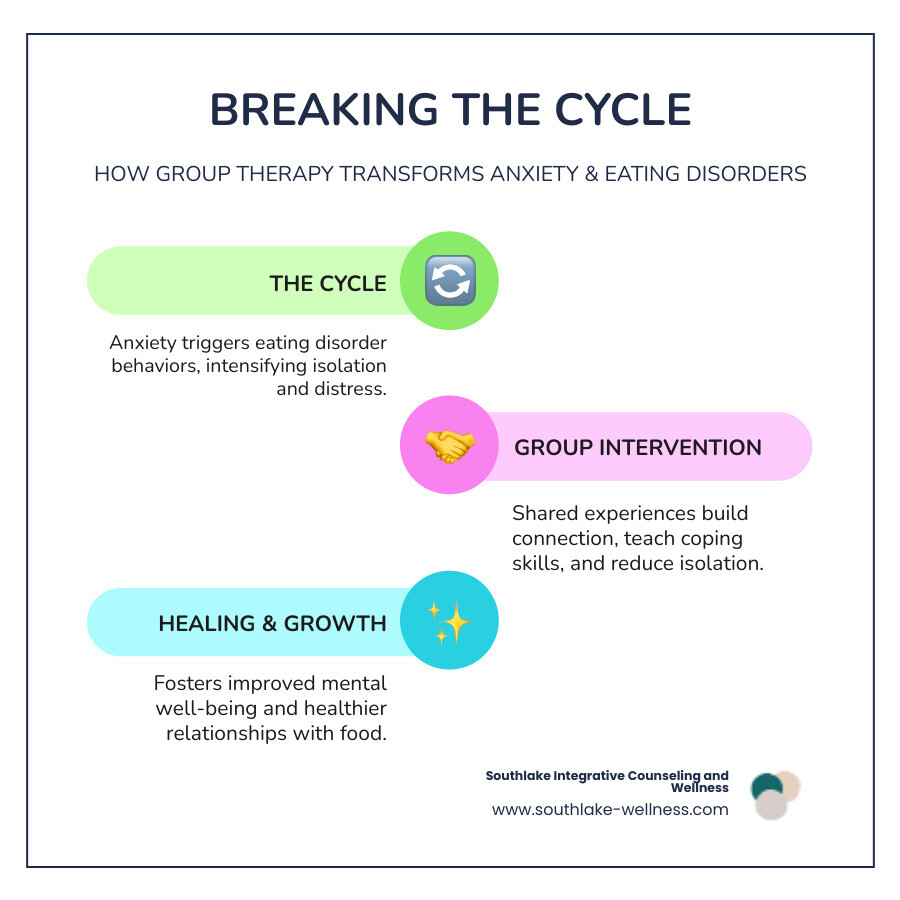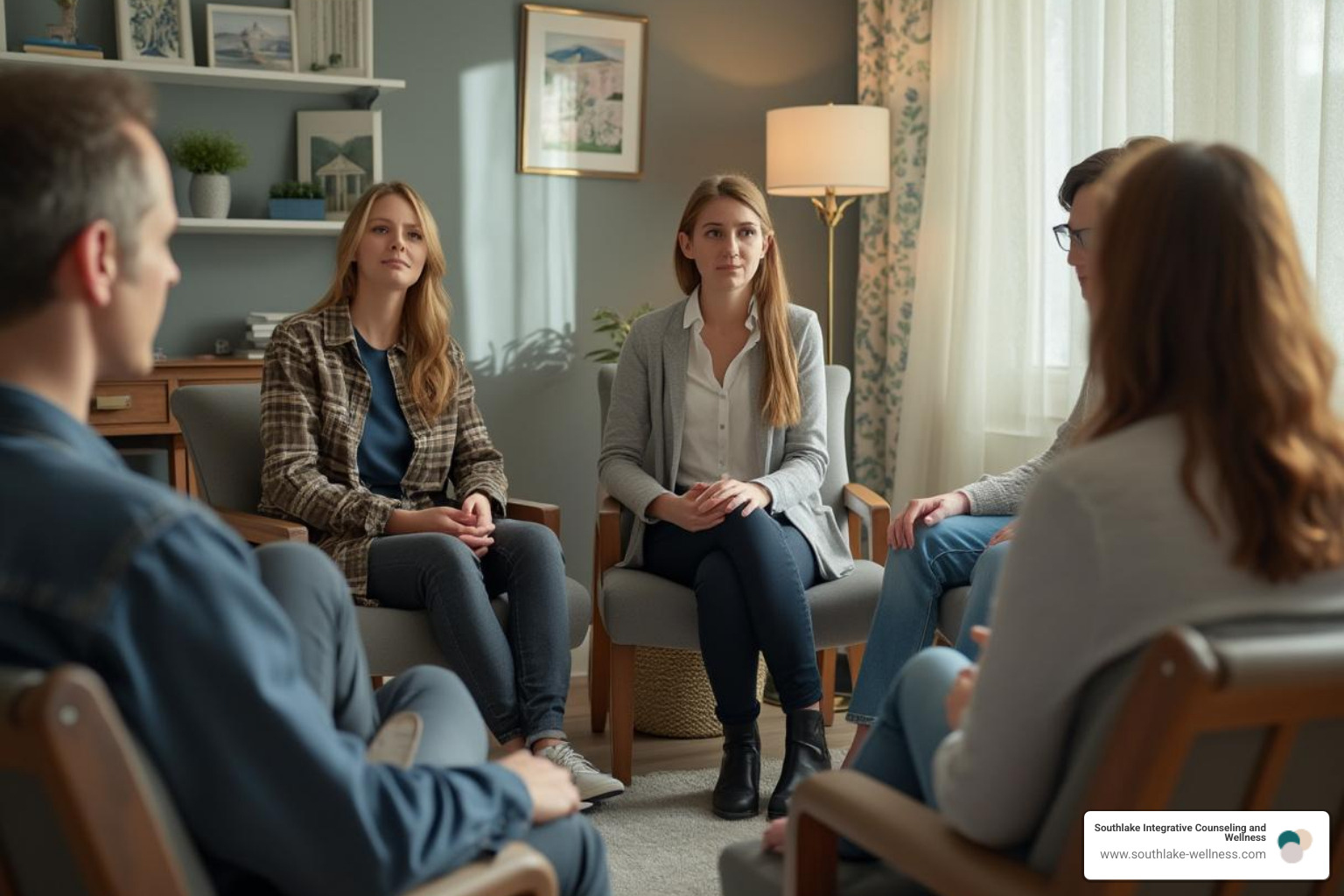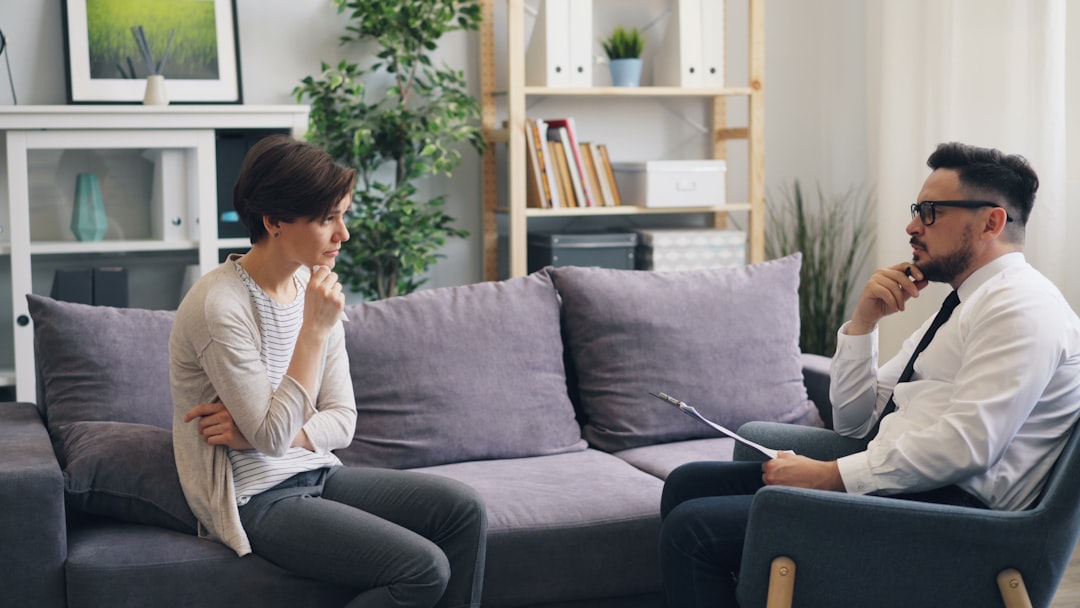
Open uping Healing: Group Therapy for Anxiety and Eating Disorders
If you're seeking support for counseling group session anxiety and eating disorders, here’s what group therapy offers:
- Shared experience: Connect with others facing similar challenges, reducing feelings of isolation.
- Expert guidance: Licensed counselors lead sessions, providing a safe space and structured support.
- New perspectives: Learn from peers and gain insights into your own patterns.
- Anxiety reduction: Address social anxieties and practice new coping skills in a supportive setting.
- Cost-effective: Often a more accessible option than individual therapy, while still being highly effective.
Navigating the complexities of anxiety and eating disorders can feel incredibly isolating. You might feel alone with your thoughts and struggles, making daily life a significant challenge. However, hope and healing are possible, especially when found in community. A counseling group session anxiety and eating disorders offers a powerful path to recovery, providing a unique space where shared understanding fosters profound growth. It's a place to connect, learn, and heal together.
Many clients even describe group therapy as their favorite part of treatment, highlighting its unique power.
I'm Holly Gedwed, a licensed professional counselor associate and licensed chemical dependency counselor. For over a decade, I’ve specialized in customizing therapeutic approaches, particularly in counseling group session anxiety and eating disorders, helping individuals build confidence and new skill sets for lasting change.

Simple guide to counseling group session anxiety and eating disorders terms:
- advantage of group counsellifacilitating a group counselling sessionng sessions
- facilitating a group counselling session
- evidence-based group therapy
The Deep Connection Between Anxiety and Eating Disorders
It's a common misconception that eating disorders are just about food. In reality, they are complex mental health conditions that often intertwine with other significant struggles, especially anxiety. Millions of people grapple with these challenges, and while the numbers vary, it's clear how widespread they are. For instance, among women, roughly 1.4% experience Anorexia Nervosa (AN), about 1.9% face Bulimia Nervosa (BN), and 2.8% struggle with Binge Eating Disorder (BED). Men also experience these conditions, with rates around 0.2% for AN, 0.6% for BN, and 1.0% for BED. These statistics truly highlight the prevalence of these difficult journeys.
In our practice, we consistently see a powerful connection between eating disorders and anxiety. Often, anxiety symptoms emerge before any disordered eating behaviors begin. It's almost as if eating disorders become a way to manage overwhelming anxiety, offering a false sense of control when life feels chaotic, or a desperate attempt at perfectionism, or a shield against intense social anxiety. This isn't just our observation; research strongly supports that eating disorders frequently co-occur with anxiety, depression, substance use, and PTSD. This deep, intricate link is why any effective treatment for counseling group session anxiety and eating disorders must address both the eating disorder and the co-occurring anxiety together. For more scientific insights into these psychiatric comorbidities, you can explore this research here.
Why a Specialized Approach is Crucial
The behaviors we see in eating disorders often serve a specific purpose for the individual; they act as coping mechanisms for deep emotional distress. For example, restricting food might offer a temporary feeling of mastery, while bingeing or purging could be an attempt to numb difficult emotions. This can make the journey incredibly isolating, as feelings of shame or an inability to share their struggles can keep individuals trapped.
At Southlake Integrative Counseling and Wellness, we understand that healing from an eating disorder goes far beyond simply stopping unhealthy eating patterns. It's about refinding your true self, separate from your eating habits, weight, or body image. Our unique approach accepts the mind-body connection, recognizing that genuine healing means addressing the underlying causes of distress. We focus on fostering overall emotional balance and building resilience. We truly believe in integrated treatment that sees and supports the whole person, not just the symptoms.
Understanding Different Eating Disorders
While all eating disorders share a common thread — a disturbed relationship with food, body image, and weight — each has its own distinct characteristics and challenges:
- Anorexia Nervosa (AN): This involves severe self-starvation and significant weight loss. Individuals often have a distorted body image and an intense, overwhelming fear of gaining weight.
- Bulimia Nervosa (BN): Characterized by a cycle of binge eating followed by compensatory behaviors like purging (vomiting, laxative abuse), excessive exercise, or fasting. Those with BN often maintain a "normal" weight, making it sometimes harder for others to detect their struggle.
- Binge Eating Disorder (BED): Defined by recurrent episodes of eating unusually large amounts of food in a short period, often accompanied by strong feelings of lack of control, guilt, and shame, but without the compensatory behaviors seen in BN.
Each of these disorders presents unique problems on the path to recovery, especially when anxiety is woven into the picture. For more comprehensive information on these and other eating disorders, we encourage you to visit the National Eating Disorder Association here.
Exploring Group Therapy Modalities for Eating Disorders
Imagine a space where you're not alone in your journey, where others truly "get" what you're going through. That's the heart of group therapy! It's a powerful way to find support and healing together. In these sessions, one or two caring therapists guide a small group of individuals, creating a safe and structured environment for everyone. It's incredibly comforting to realize that your struggles aren't unique – that's what we call universality. And as you listen to others and share your own experiences, you'll naturally learn and grow together. This is interpersonal learning in action. Group therapy is also often a more accessible and affordable option for many seeking help.

When we talk about a counseling group session anxiety and eating disorders, it’s exciting to know that various therapy approaches can be adapted to this group setting. Each one offers a slightly different path to understanding and healing.
Overcome Anxiety & Eating Disorders Together
Join a safe, supportive group therapy setting to share, heal, and grow. Contact Our Team Today
Psychodynamic Group Therapy
This approach is like a deep dive into what makes us tick. It gently explores the deeper, often hidden, reasons behind our current struggles. We look at past experiences, especially early relationships and how they might have shaped your attachment style. Understanding these patterns helps us see how they might be affecting your relationships and coping mechanisms today. The group itself becomes a kind of "social laboratory," where you can safely explore and work through relationship challenges in real-time. This deeper understanding can be incredibly powerful for uncovering the emotional roots of both eating disorder behaviors and anxiety.
Cognitive-Behavioral Therapy (CBT) Groups
CBT groups are more hands-on and practical. Here, the focus is on identifying and changing those unhelpful thought patterns and behaviors that keep you stuck. We'll work together to build practical coping skills, learn to challenge negative self-talk, and make real changes in your daily life to manage your symptoms. For those dealing with eating disorders, this might mean facing food-related fears or developing healthier eating habits. We also focus on strategies to prevent relapse. CBT is a well-researched and highly effective therapy for many conditions, including eating disorders and anxiety, and its structured nature makes it perfect for a group setting.
Psychoeducational Groups
These groups are all about equipping you with knowledge and tools. They focus on giving you clear information about eating disorders, anxiety, and general mental well-being. You might learn about nutrition, understand more about your condition, and find practical strategies you can use in your daily life. While these groups are fantastic for building knowledge and skills, they typically don't dive as deep into emotional processing or relationship dynamics as psychodynamic or process-oriented CBT groups. They can be a wonderful first step or a valuable addition to your overall treatment plan.
The Effectiveness of a Counseling Group Session for Anxiety and Eating Disorders
So, how effective is a counseling group session anxiety and eating disorders? The good news is, we're seeing some truly promising results! Especially when we look at approaches like psychodynamic therapy, which dives into deeper emotional roots. These groups really tap into the power of connection. Think about it: when you feel a strong sense of belonging, like everyone is in it together (group cohesion), and you trust your therapist and the group members (therapeutic alliance), amazing things can happen. These factors, along with exploring how our past experiences and attachment styles shape us, really help pave the way for healing.

Evidence for Psychodynamic Group Therapy
Many studies have looked into how well psychodynamic treatments work for eating disorders, and the findings are quite encouraging, especially for Bulimia Nervosa (BN) and Binge Eating Disorder (BED). For folks dealing with BN, group therapy has shown some really positive effects in helping to improve bulimic symptoms. In fact, studies show that people can see a lot of improvement, with remission rates (meaning a big reduction in symptoms) ranging from about 31.6% to a fantastic 100% in different groups. Of course, some people do drop out, with rates from 0% to 60%, but the potential for healing is clear.
For Binge Eating Disorder, a specific type of group therapy called Group Psychodynamic-Interpersonal Psychotherapy (GPIP) has also proven to be effective. Remission rates here have been from 25% to 78.4%, with dropout rates between 17.6% and 25.7%. One study even found that a whopping 81% of patients reported positive changes in their binging and purging behaviors after this kind of group work, especially when combined with some cognitive-behavioral tools.
Now, when it comes to Anorexia Nervosa (AN), the evidence for psychodynamic groups is still growing, and we need more research. But the positive results for BN and BED certainly give us hope. It's true that a lot of the current research, like the meta-analysis of group psychotherapy for eating disorders here, points out that we need more "gold standard" studies. But even with those limitations, we can clearly see that group therapy is a powerful tool.
How Attachment Anxiety Manifests in a Counseling Group Session for Anxiety and Eating Disorders
Anxiety, especially attachment anxiety, plays a big role in how people engage in group therapy, particularly if they also struggle with eating disorders. If you have an anxious attachment style, you might find yourself worrying about being rejected, constantly looking for reassurance, or even finding it hard to trust others in the group. These feelings can affect how much you participate and even whether you stick with the therapy. For example, some research suggests that if you tend to avoid close relationships (an avoidant attachment style), you might be less engaged and more likely to leave group therapy early. You can dive deeper into this research on attachment anxiety's impact here.
In a counseling group session anxiety and eating disorders, the group itself becomes like a mini version of your real-world relationships. This means that any fears or patterns you have in your everyday life often show up right there in the group. And guess what? This is actually a wonderful opportunity! It allows us to see these patterns in action, talk them through, and practice new, healthier ways of connecting with yourself and others. It’s a safe space to try out new ways of being.
Key Therapeutic Factors in a Counseling Group Session for Anxiety and Eating Disorders
So, what are the special ingredients that make a counseling group session anxiety and eating disorders so effective? It’s a mix of several powerful factors that work together to help you heal and manage anxiety:
- Group Cohesion: This is that warm, fuzzy feeling of belonging, acceptance, and truly feeling supported by everyone in the group. When there's high cohesion, it's like a safe harbor where you feel comfortable sharing your deepest thoughts and engaging fully in the healing process. It's the comforting feeling of "we're all in this together."
- Therapeutic Alliance: This is the trusting and collaborative bond you build with your therapist(s) and fellow group members. A strong alliance is like a sturdy bridge, essential for exploring tough emotions and making real changes.
- Rupture and Repair: Let's be real, even in the best groups, disagreements or misunderstandings can pop up. But the magic happens when we can talk about these "ruptures" and work through them together. It's a powerful lesson in how to steer conflicts and actually make relationships stronger.
- Corrective Emotional Experiences: The group offers a unique chance to rewrite old stories. If you felt unheard as a child, being truly listened to and validated in the group can be a profoundly healing experience. It's like going back in time and getting a do-over, but this time with support.
- Instillation of Hope: Seeing other group members make progress, even just small steps, can be incredibly inspiring. It helps you believe in your own ability to recover. This shared optimism is a powerful fuel for your journey.
- Interpersonal Learning: In the group, you learn so much about yourself and how you interact with others. You get honest feedback, practice new social skills, and gain insights into your relationship patterns. It’s truly like a safe laboratory for social experimentation!
- Universality: This is the incredible relief that washes over you when you realize your struggles aren't unique. Finding that others share similar thoughts, feelings, and experiences dramatically reduces feelings of shame and isolation. It’s that profound "aha!" moment that can be incredibly validating.
- Altruism: Believe it or not, helping others in the group can be just as healing for you! When you offer support or insights to your peers, it boosts your own self-esteem and gives you a wonderful sense of purpose.
- Catharsis: Sometimes, simply expressing and releasing intense emotions in a supportive group environment can be incredibly freeing and a huge step towards change. It's like letting out a big sigh you didn't even know you were holding.
These factors together create a dynamic and truly transformative healing environment that sometimes individual therapy alone just can't quite replicate.
Is Group Therapy the Right Path for You?
Deciding whether group therapy is right for you requires honest self-reflection and a willingness to explore change. I know the thought of sharing your struggles with others might feel overwhelming, especially when anxiety is part of the picture. It's completely natural to feel nervous about opening up to strangers about something as personal as your relationship with food and your body.
But here's what I've witnessed time and again in my practice: there's something truly powerful about shared vulnerability. When you sit in a circle with others who understand your struggles, something magical happens. The shame that thrives in isolation begins to lose its grip.

Think of group therapy as holding up a mirror - not to judge yourself harshly, but to see patterns you might miss on your own. Sometimes we're so close to our eating disorder and anxiety that we can't see our blind spots. Other group members, walking similar paths, can gently point out things we've been unable to see ourselves.
The readiness for change piece is important too. You don't need to have all the answers or feel completely ready. But having some openness to the possibility that things could be different - that's a good starting place.
Benefits of the Group Setting
The group setting offers something individual therapy simply cannot replicate. When you participate in a counseling group session anxiety and eating disorders, you're stepping into a space where isolation and shame begin to melt away. Eating disorders love secrecy - they thrive when you're alone with your thoughts. Group therapy shines a light into those dark corners.
One of the most profound moments I witness is when someone realizes their experiences are normal within the context of eating disorders. That voice in your head telling you you're "crazy" or "the only one" who thinks this way? It gets quieter when you hear others describe similar struggles. This normalization is incredibly freeing.
The group also becomes a safe laboratory for developing social skills. Many people with eating disorders struggle with social anxiety or feel awkward around food in social settings. In group, you get to practice being yourself, speaking up, and connecting with others - all while building confidence for the world outside our walls.
You'll be amazed by the diverse perspectives each person brings. Someone might share a coping strategy that never occurred to you, or offer a way of looking at a situation that completely shifts your perspective. This collective wisdom becomes a resource you can draw from long after group ends.
And let's be practical - group therapy is often more cost-effective than individual sessions alone, making quality mental healthcare more accessible while still being incredibly impactful.
Potential Challenges and How to Steer Them
I won't sugarcoat it - group therapy comes with its own set of challenges, especially when you're dealing with anxiety alongside an eating disorder. The anxiety about sharing is real and valid. Your heart might race at the thought of speaking up, or you might worry about being judged.
Here's what I tell my clients: you get to go at your own pace. No one will force you to share before you're ready. We create an environment where even just listening and being present is valuable participation.
Interpersonal conflicts will happen - it's part of being human. But here's the beautiful thing: when conflicts arise in group, we work through them together. This teaches you skills for handling disagreements and misunderstandings in your everyday relationships. A skilled facilitator views these moments as golden opportunities for growth, not problems to avoid.
Sometimes progress feels slow, and that can be frustrating. Healing isn't linear, and some days will feel harder than others. But remember, every small step forward matters, even when you can't see it in the moment.
Finding the right group fit is crucial. Not every group works for every person. Some people with anorexia might feel more comfortable in a mixed group rather than one where everyone has the same diagnosis. We work carefully to match you with a group where you'll feel supported and challenged in healthy ways.
The importance of a skilled facilitator cannot be overstated. Your group leader needs to manage complex dynamics, ensure everyone feels safe, and guide the process expertly. At Southlake Integrative Counseling and Wellness, we're committed to providing that level of expert care to help you reach your personal treatment goals through our holistic approach.
Intensive Group Therapy Programs
Our intensive therapy approach blends group support with individualized care.Learn More About Intensive Therapy
Conclusion: Taking the First Step Toward Collective Healing
Whew, we've covered a lot of ground today, haven't we? Navigating the path of counseling group session anxiety and eating disorders can feel like a winding road. But what we've finded together is that this journey, though challenging, holds incredible promise for healing. We've seen just how deeply anxiety and eating disorders are connected, often feeding into each other. And we've explored how group therapy isn't just an option, but a truly unique and powerful way to find your footing. It's a path that offers connection, understanding, and often, a more accessible way to heal.
Think about it: from the clear evidence for approaches like psychodynamic therapy, especially for Bulimia Nervosa and Binge Eating Disorder, to the way group dynamics help us face attachment anxiety head-on, it's clear group therapy is more than just talking. It's about those powerful therapeutic factors we discussed – feeling a part of something, building trust, learning from others, and gaining hope. This kind of collective healing isn't just possible; it's truly transformative.
At Southlake Integrative Counseling and Wellness, this belief in connection and community is at the very heart of what we do. We understand that real healing isn't just about fixing symptoms. It's about looking at you as a whole person – your mind, your body, your spirit. Our holistic approach means we bring together evidence-based therapies with other supportive practices to help you find true emotional balance and strength. We're not just here to guide you; we're here to walk alongside you, every step of the way.
If you're feeling ready to take that first brave step towards a healthier, more connected life, we invite you to reach out. Come explore our unique approach to eating disorder treatment. You can learn more about how we can support your journey to lasting well-being here.